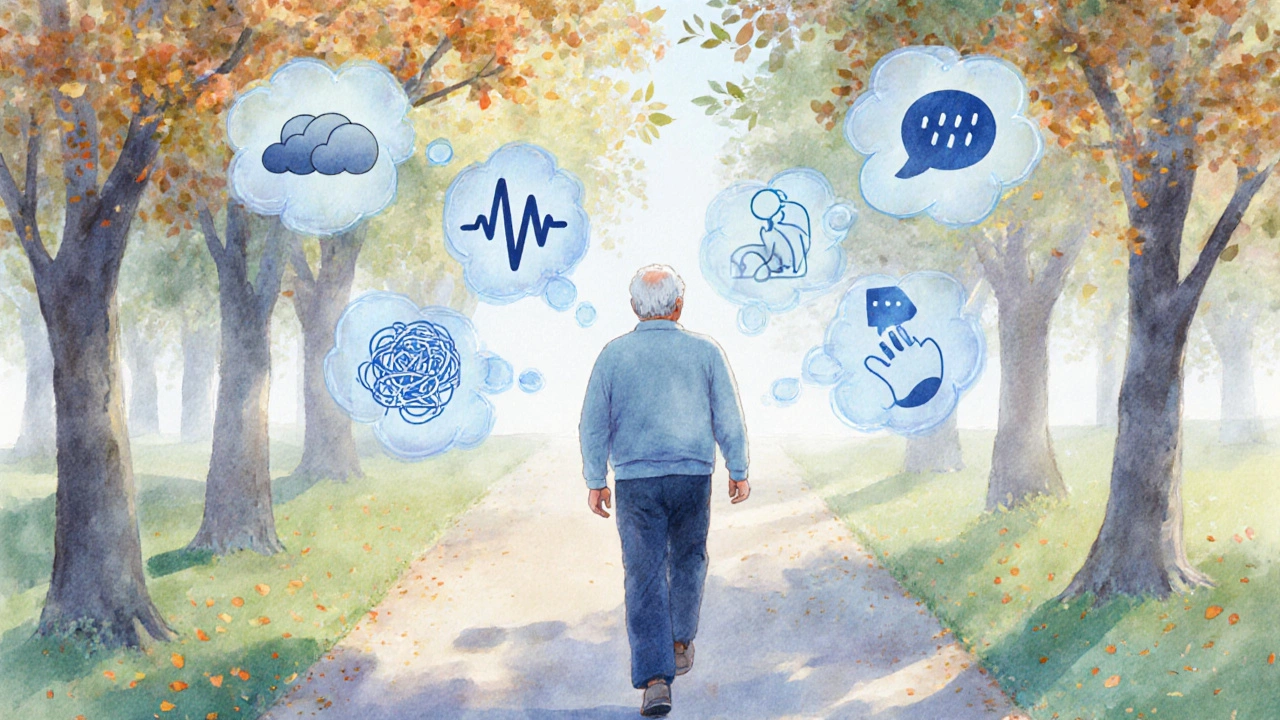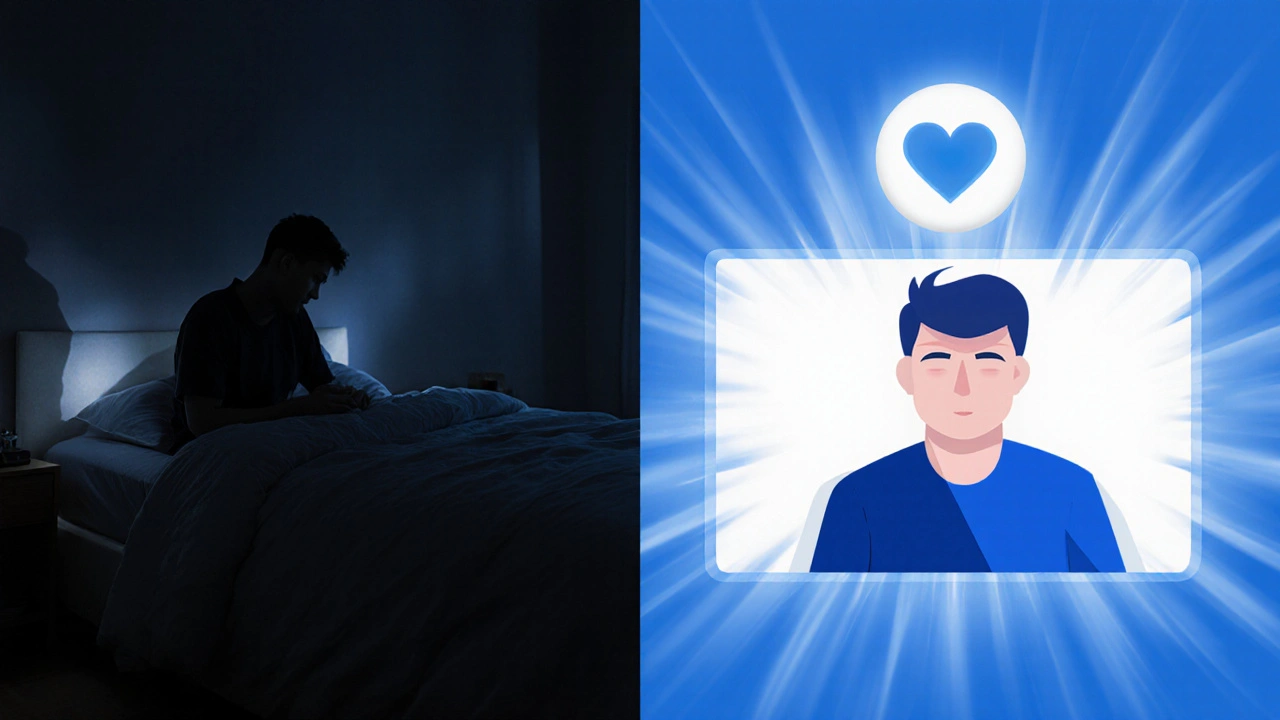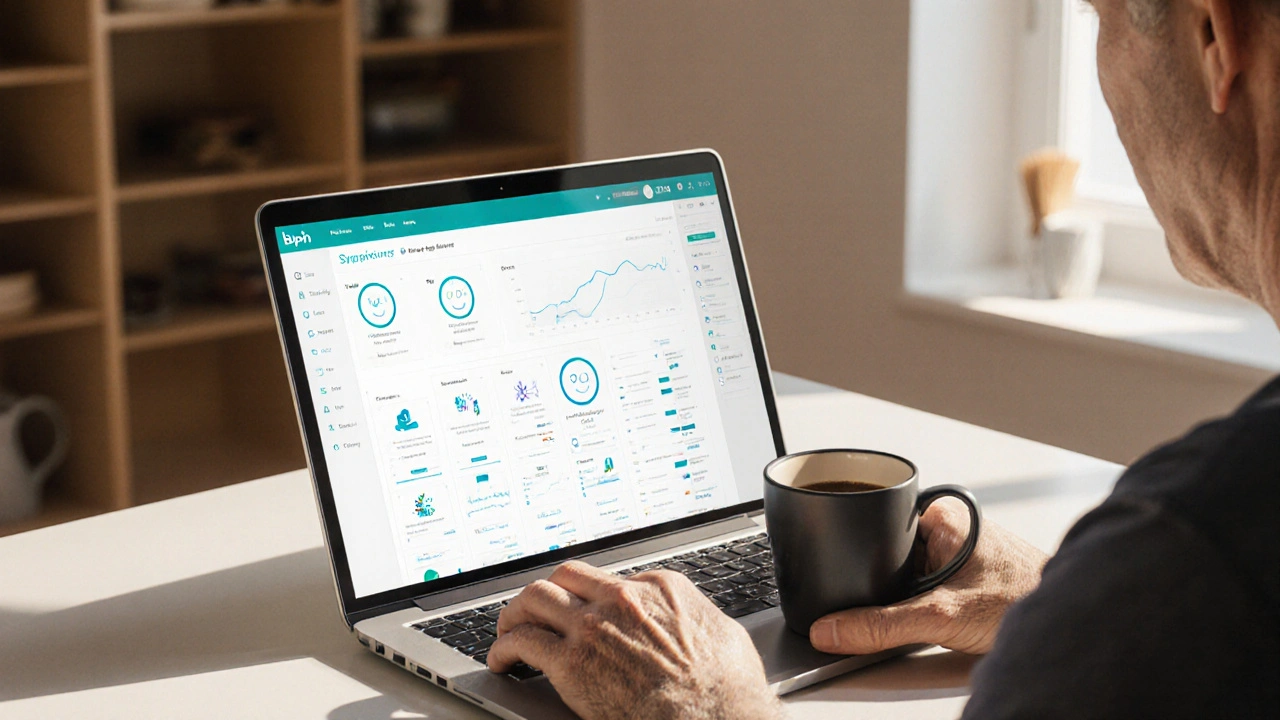BPH Mental Health Tracker
Track your emotional well-being alongside your BPH symptoms to better understand how mental health impacts your condition.
Your Mental Health Insights
When a man discovers he has benign prostatic hyperplasia, the first thoughts are usually about urinary symptoms and medical treatment. What often goes unnoticed is the emotional strain that creeps in - feelings of embarrassment, frustration, and even sadness. Ignoring that mental side can turn a manageable condition into a daily battle. This article breaks down why mental health support isn’t a luxury but a key part of living well with BPH.
Key Takeaways
- Urinary issues from BPH can trigger anxiety, depression, and reduced quality of life.
- Early mental health screening helps catch problems before they worsen.
- Therapy, support groups, and lifestyle tweaks all boost coping ability.
- Urologists and primary care doctors should ask about mood as part of routine BPH care.
- Having a personalized mental‑health plan improves treatment adherence and overall well‑being.
Understanding BPH and Its Emotional Toll
Benign Prostatic Hyperplasia is a non‑cancerous enlargement of the prostate gland that typically affects men over 50. It narrows the urethra, leading to frequent urges, nighttime trips, and a weak stream. While the physical symptoms are well‑documented, the emotional side often stays hidden.
The constant need to run to the bathroom can interrupt work, social events, and intimate moments. Over time, that disruption breeds self‑consciousness. Men may start avoiding outings or feeling isolated, which sets the stage for anxiety and depression.
Common Mental Health Challenges for Men with BPH
Anxiety is a heightened state of worry that can arise from fear of incontinence or embarrassment during public activities. It often shows up as a racing heart before a meeting or a quick trip to the restroom.
Depression may develop when men feel their condition limits their independence. Symptoms include low energy, loss of interest in hobbies, and a lingering sense of hopelessness.
Reduced Quality of Life captures the overall decline in daily satisfaction, sleep quality, and emotional well‑being. Studies from the American Urological Association show that men with severe BPH symptoms score up to 30% lower on quality‑of‑life surveys.
How Mental Health Affects BPH Outcomes
When anxiety spikes, the body releases stress hormones like cortisol. Those hormones can tighten pelvic muscles, worsening urinary urgency. In other words, a worried mind can make the physical problem feel worse.
Depression, on the other hand, often leads to missed appointments and poor medication adherence. A man who feels hopeless might skip his prescribed alpha‑blocker or 5‑alpha‑reductase inhibitor, letting the prostate enlarge further.
In short, mental well‑being directly influences the effectiveness of medical treatment and the speed of symptom progression.

Effective Mental Health Support Strategies
Addressing the emotional side requires a mix of professional care, peer support, and personal habits.
Professional Counseling
Cognitive Behavioral Therapy is a structured, short‑term therapy that helps reframe negative thoughts and develop coping skills. For men with BPH, CBT can reduce anxiety about bathroom trips and improve sleep.
Support Groups
Connecting with other men facing the same prostate issues creates a safe space for sharing tips and venting frustrations. A Support Group often meets monthly and is facilitated by a urologist or mental‑health professional. Participants report feeling less alone and more motivated to stick with treatment plans.
Medication for Mood
In some cases, a doctor may prescribe an antidepressant or anti‑anxiety medication. These drugs can balance brain chemistry while the patient works on lifestyle changes. It’s crucial that the prescribing Urologist coordinates with a psychiatrist or primary‑care physician to avoid drug interactions.
Lifestyle Modifications
- Limit caffeine and alcohol in the evening to reduce nighttime trips.
- Practice pelvic floor exercises to strengthen muscles and lower urgency.
- Adopt a regular sleep schedule; good rest lowers cortisol and eases anxiety.
- Engage in moderate aerobic activity-walks, cycling, or swimming-to boost mood naturally.
Table: Comparing Common Mental Health Interventions for Men with BPH
| Intervention | Typical Effectiveness* | Average Cost (USD) | Time Commitment |
|---|---|---|---|
| Cognitive Behavioral Therapy | High - 60‑70% symptom reduction | $100‑$150 per session | Weekly 45‑min for 8‑12 weeks |
| Support Group (in‑person) | Moderate - 40‑50% improvement | Free‑$20 per meeting | Monthly 1‑hour session |
| Medication for Mood | Variable - 30‑60% depending on adherence | $30‑$80 per month | Daily pill, regular check‑ups |
| Self‑Help Lifestyle Changes | Low‑to‑moderate - 20‑35% benefit | Minimal - equipment optional | Daily 20‑30min activity |
*Effectiveness based on patient‑reported outcome measures in recent urology‑psychology cross‑disciplinary studies.
Integrating Mental Health Checks into Routine BPH Care
Every urology visit should include a brief mental‑health screen. Simple questions like “How often do you feel anxious about bathroom trips?” or “Have you lost interest in activities you used to enjoy?” reveal red flags early.
If a screen flags concern, the urologist can refer the patient to a mental‑health specialist. Collaboration ensures that medication choices don’t clash and that treatment goals stay aligned.
Creating a Personal Mental‑Health Action Plan
- Write down current symptoms and how they affect daily life.
- Choose one professional support option (CBT, psychiatrist, or support group).
- Set a realistic lifestyle goal-like a 15‑minute evening walk.
- Schedule a follow‑up with your urologist to discuss progress.
- Track mood and urinary patterns in a journal; notice patterns.
Seeing improvement in both bladder function and emotional outlook reinforces the habit loop, making the plan sustainable.
Quick Checklist for Men Managing BPH and Mental Health
- Ask your doctor about a mental‑health screen at each visit.
- Identify a trusted therapist or support group.
- Limit bladder irritants after dinner.
- Practice pelvic floor exercises three times a week.
- Log sleep, mood, and bathroom trips to spot trends.

Frequently Asked Questions
Can anxiety really make BPH symptoms worse?
Yes. Stress hormones tighten pelvic muscles, which can increase urgency and frequency. Managing anxiety often eases those physical complaints.
Is it safe to take antidepressants with BPH medication?
In most cases, yes, but a urologist should review potential interactions. Some antidepressants can affect blood pressure, which needs monitoring.
How often should I attend a support group?
Monthly meetings work for most men, but weekly sessions are great if you’re experiencing a flare‑up of symptoms or emotions.
What lifestyle changes have the biggest impact?
Cutting caffeine after 2pm, staying active, and doing regular pelvic floor exercises consistently show the strongest improvements in both urinary and mood outcomes.
Should my partner be involved in my mental‑health plan?
Absolutely. A supportive partner can help monitor symptoms, encourage attendance at therapy, and reduce feelings of isolation.


Comments (10)
Thanks for highlighting how mental health intertwines with BPH. It's easy to overlook the emotional toll when dealing with frequent bathroom trips. Recognizing anxiety, loneliness, and sleep disruption early can prevent more serious issues. Keeping a simple tracker alongside physical symptoms, as you suggested, empowers patients to notice patterns. Moreover, sharing these insights with a trusted healthcare provider encourages a holistic approach. Ultimately, integrating mental health support reduces stigma and improves overall quality of life.
Yo, looks like the pharma giants don’t want us to connect the dots between BPH and our minds-they’d rather sell pills, not peace of mind. Maybe they’re hiding a cure behind all that ‘mental health’ talk. Anyway, keep an eye on your vibes, man.
Listen, if you’re still ignoring the mental side of BPH you’re basically signing up for misery. Get your act together, stop pretending it’s just a ‘man thing’ and start tracking that shit. No more excuses!
One could argue that the bladder, much like the restless mind, seeks equilibrium in the face of perpetual demand. When the body signals urgency, the psyche mirrors that heartbeat, stirring unease. Thus, the very act of monitoring emotional currents alongside urinary patterns becomes a modest meditation on self‑awareness. In this light, BPH transforms from a mere physiological hurdle into a catalyst for deeper introspection.
First and foremost, thank you for bringing attention to a topic that often goes unspoken. It’s vital that men feel safe discussing both the physical and emotional aspects of BPH. The tracker you’ve provided is a practical tool that encourages self‑reflection without judgment. By normalizing these conversations, we can reduce isolation and foster community support. If anyone needs additional resources, please reach out-there are counselors and support groups ready to help.
Honestly this whole mental health angle feels like a buzzword ploy it’s all about market share and not caring about real men suffering in silence. You think ticking boxes on a website will magically cure the anxiety that comes with waking up three times a night and fearing that your friends will notice your frequent trips? The reality is far more complex and you’re ignoring the socioeconomic factors that keep men from seeking help. Most men grew up hearing that emotions are a sign of weakness and they internalize that belief until they explode. The tracker may be a nice gimmick but without professional guidance it’s just data that no one knows what to do with. You need actual therapy sessions not just a screenshot of your symptoms. Also the language in the article assumes everyone has internet access and the literacy to navigate a UI which is not the case for many older patients. There’s also the issue of insurance coverage for mental health services that most men can’t afford. And let’s not forget the stigma that still lingers in doctors’ offices where a simple mention of depression can be dismissed as “just stress”. So before we applaud this initiative we should demand evidence based outcomes and transparent funding. Otherwise we’re just feeding the corporate machine that profits from our discomfort. In short the article is a well‑intentioned but shallow attempt at solving a deep‑rooted problem that needs more than an interactive checkbox. I hope future updates include real clinical trials and community engagement rather than clever design. Otherwise it’s just another fluff piece in the endless sea of wellness content. Finally, men need allies not just tools, and those allies should be trained professionals who can listen without judgment.
Great initiative! It reminds us that mental health is as important as any physical symptom. For men from diverse backgrounds, cultural expectations can make opening up even harder, so a simple tracker can serve as a private starting point. Encourage friends to share their experiences, and consider local support groups that respect cultural nuances. Together we can break the silence.
Interesting point, but I’d argue that focusing on self‑tracking might distract from systemic issues like healthcare accessibility. Still, a personal log can be useful if it’s part of a larger strategy.
Oh great, another app to remind me I can’t hold my bladder.
Yeah, because what we really needed was a notification for every bathroom break-thanks for the innovation, tech gods.